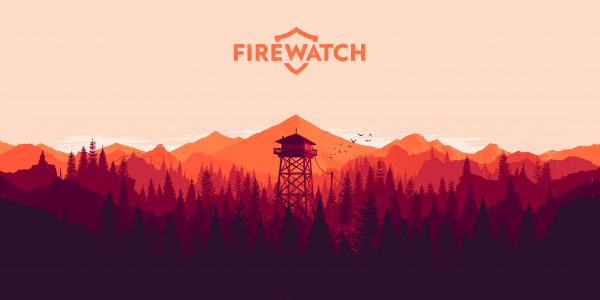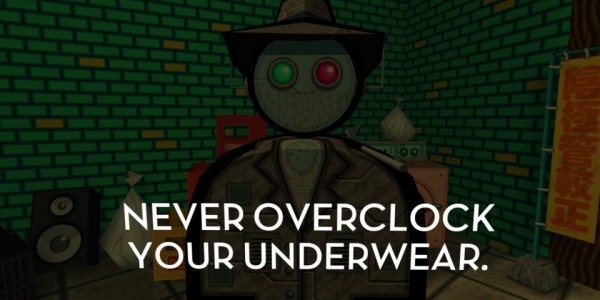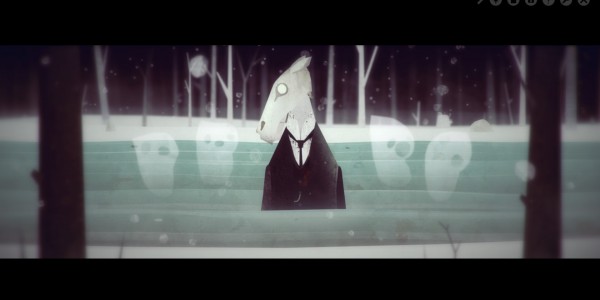Exploration Games: The Ones That Stand Out
"As Campo Santo shows off its new exploration game 'Firewatch' we take a look at a few other interesting takes on the genre"
San Franciscan indie studio 'Campo Santo' recently had the first big coming out for their first game
Firewatch at Pax Prime over in Seattle. It is a rather lovely looking atmospheric first-person explore 'em up set in the wilderness of Wyoming. Details are few and far between on the game right now aside from it's suitably
enigmatic reveal trailer. I think it's safe to assume though that it will follow a fair few of the tropes we've come to expect from the exploration genre, or
walking simulators, if you prefer.

These games typically take some cues from the adventure genre with a heavy emphasis on ambience, relatively few gameplay systems to worry about and more often than not a sparse number of characters to interact with. Most are defined by their modest scale, more often than not a result of both their humble indie roots as well as a desire to create a game that is unburdened by clutter. They are especially good for allowing someone with a clear story in their head but a lack of experience with gameplay systems to implement that narrative into an interactive medium.
Thanks to the comparative simplicity of the genre and the ease with which devs can release their work nowadays we're starting to see a
lot of these games hit the market. Especially so after the runaway success and acclaim of the watershed
Gone Home last year. Here I'm going to highlight a couple that break away from the tropes of the genre and do things a little differently.
Jazzpunk
Humor is difficult to do well in video games, mostly because of the interactive nature of the medium itself. In films/TV/books etc. the only path to follow is the one that creator has set for you, as long as you're looking at the screen while watching a film there's no way you'll miss the joke. In games though players could be doing any number of things, so that reliance on the ability to tightly time your jokes goes out the window. They might of chose to look somewhere else or they could have just gone down a different path entirely.
Jazzpunk gets over this hurdle by following the
Airplane! model of humor delivery: Just don't stop with the jokes.

It really is quite unique to see a game devote itself so singularly to one task, it is trying at all times to entertain you but crucially it never tries
too hard. The scatterbrained silly humor of
Jazzpunk's influences could easily devolve into just random nonsense but luckily it has its own internal logic of cyberpunk tomfoolery and sticks to it for all of its 2-ish hours in length.
Where this game innovates where other similar games don't is in how it gives you the opportunity to seek out and inhabit the jokes yourself, in a way other mediums can't. Chances are if an object looks like it can be interacted with then it can and there'll
always be some kind of punchline.
Jazzpunk however goes beyond just delivering a funny piece of wordplay or a clever reference. It does that but it also uses it's interactive nature to build larger, sillier, more player-influenced jokes. I don't want to spoil anything specifically but I think its fair to say
Jazzpunk is just as aware of how to get guffaws from its gameplay as it is from it's writing.
Year Walk
Originally released on iOS but now also available on PC,
Year Walk is based on something known as the 'Årsgång' (roughly translating out to 'annual walk'), an old tradition of Swedish origin that is no longer practiced. You play an unnamed character embarking on said walk through a mysterious and frosty 19th century Swedish woodlands filled with all sorts of bizarre but wondrously designed creatures. The game uses a parallax style effect that gives it the appearance of something like a storybook, blurring the lines quite seamlessly between portraying the environment as both 2D and 3D.

Of particular interest is the game's encyclopedia that was a separate app on mobile devices but now comes integrated with the PC version. Without wishing to spoil much I'll just say it starts off as a handy lexicon for you to reference when you encounter something you're unfamiliar with but as the story progresses it becomes something much more than that. It was a rather novel use of the app format on iOS but is just as cool a trick when seen on PC.
The unnervingly quiet eeriness that permeates the woods gives
Year Walk a distinctly horror-esque tone. There are occasional (and admittedly well done) jump scares but luckily for the most part it sticks to piling on the tension bit by bit through more subtle pokes at your sanity. I don't normally tell people how they 'should' go about playing a particular game but I do recommend playing
Year Walk with headphones if you decide to give it a punt. Completely immersing yourself in it's surroundings is a truly chilling experience.
NaissanceE
Let's be frank: these exploration games can occasionally have a tendency towards the pretentious. A lot of them explicitly pitch themselves as art and that's fair enough but you need to back up claims like with something meaningful, whether it be through your game's story or it's presentation or whatever. Otherwise you just risk coming across as pointlessly highly faulting.
Developers 'Limasse Five' describe
NaissanceE as '
a game, a philosophical trip and an artistic experience.' You'd be forgiven for greeting that pitch with an askance glance but fortunately when you actually see the game you realize what they mean. NaissanceE is light on gameplay substance but boy is it a beguiling game to just inhabit.
The bulk of your time is spent engaging in some basic platforming and platforming but the main draw is the various ways in which it pleasures your eyes and your eyes. The overall color palette is intentionally limited which helps give it a stark, cold look and the way it uses harsh geometry and lighting tricks is a massive boon to behold. At times the environments even resemble the designs of 60s and 70s Sci-fi cinema, 2001: A Space Odyssey comes to mind particularly.
Due to it's alienatingly cold aesthetic much of the game's emotional bedding is provided by it's soundtrack. It is mostly made up of the sort of perturbingly stark ambient music that artists like Tim Hecker and Daniel Lopatin create. It's very effective at sounding like a halfway point between composed music and environmental noise. It could just as easily be emanating out from the severe surroundings as it could be coming from the soundtrack.
Those are three walking simulators (god I love that term) that I feel excel in a way that successfully differentiates them from the rest of the pack. There are others I have a great affinity for like Dear Esther and Proteus but I am aware that this is a very divisive type of game. My ultimate recommendation would be to wait for a steam sale or something like that and pick up a couple of these games and others, try them out for yourself and see if this genre strikes a chord with you. Most are quite short and sweet experiences so it shouldn't take too long for you to find out.
Do any of these games sound interesting to you or do you have recommendations of your own you want to highlight? Be sure to let us know down in the comments.


